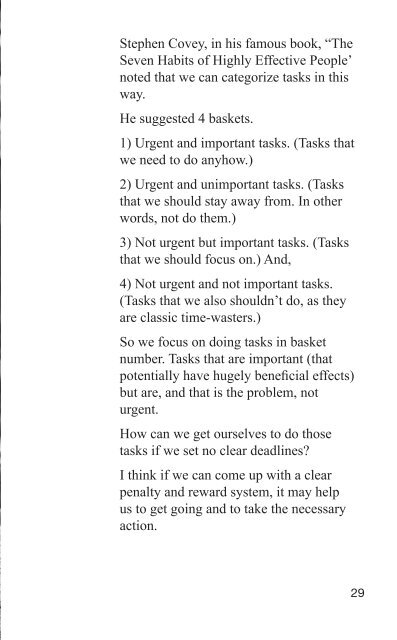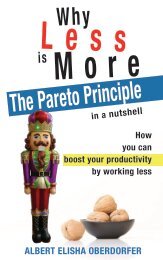POWER PRINCIPLES - ALBERT ELISHA OBERDORFER
Power principles are a kind of unwritten law. They are universal truths. They are what the law of gravity is in the realm of physics. Modern aviation is built on identifying aerodynamic principles and then applying those principles in the design and use of airplanes. They work for everyone. At all times. It is the same with those power principles. Once we learn to work with these principles, we will see their powerful effects. Get ready to learn about and then apply powerful principles such as: - THE POWER OF FOCUS, - THE POWER OF WHY, - THE POWER OF A MISSION STATEMENT, - THE POWER OF AN ACTION PLAN, - THE POWER OF A DEADLINE, - THE POWER OF A CHECKLIST, - THE POWER OF THE PARETO PRINCIPLE, - THE POWER OF IMMEDIATE ACTION, - THE POWER OF A COMPLETED TASK, - THE POWER OF REPETITION, etc. and - THE POWER OF LOVE.
Power principles are a kind of unwritten law.
They are universal truths.
They are what the law of gravity is in the realm of physics.
Modern aviation is built on identifying aerodynamic principles and then applying those principles in the design and use of airplanes.
They work for everyone.
At all times.
It is the same with those power principles.
Once we learn to work with these principles, we will see their powerful effects.
Get ready to learn about and then apply powerful principles such as:
- THE POWER OF FOCUS,
- THE POWER OF WHY,
- THE POWER OF A MISSION STATEMENT,
- THE POWER OF AN ACTION PLAN,
- THE POWER OF A DEADLINE,
- THE POWER OF A CHECKLIST,
- THE POWER OF THE PARETO PRINCIPLE,
- THE POWER OF IMMEDIATE ACTION,
- THE POWER OF A COMPLETED TASK,
- THE POWER OF REPETITION, etc. and
- THE POWER OF LOVE.
Create successful ePaper yourself
Turn your PDF publications into a flip-book with our unique Google optimized e-Paper software.
Stephen Covey, in his famous book, “The<br />
Seven Habits of Highly Effective People’<br />
noted that we can categorize tasks in this<br />
way.<br />
He suggested 4 baskets.<br />
1) Urgent and important tasks. (Tasks that<br />
we need to do anyhow.)<br />
2) Urgent and unimportant tasks. (Tasks<br />
that we should stay away from. In other<br />
words, not do them.)<br />
3) Not urgent but important tasks. (Tasks<br />
that we should focus on.) And,<br />
4) Not urgent and not important tasks.<br />
(Tasks that we also shouldn’t do, as they<br />
are classic time-wasters.)<br />
So we focus on doing tasks in basket<br />
number. Tasks that are important (that<br />
potentially have hugely beneficial effects)<br />
but are, and that is the problem, not<br />
urgent.<br />
How can we get ourselves to do those<br />
tasks if we set no clear deadlines?<br />
I think if we can come up with a clear<br />
penalty and reward system, it may help<br />
us to get going and to take the necessary<br />
action.<br />
29

















